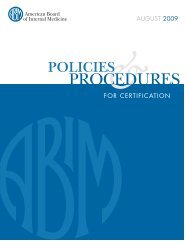The SRA Symposium - College of Medicine
The SRA Symposium - College of Medicine
The SRA Symposium - College of Medicine
You also want an ePaper? Increase the reach of your titles
YUMPU automatically turns print PDFs into web optimized ePapers that Google loves.
Papers<br />
a historically black university.<br />
Table 2: Mentoring for Grant Funding - Examples <strong>of</strong> Specific Activities<br />
• Information about grant opportunities<br />
• Finding and providing copies <strong>of</strong> successful grants<br />
• Planning or strategy meetings<br />
• Providing written information about the institution and/or institutional<br />
resources<br />
• Nuts and bolts <strong>of</strong> grants: biosketches, other support, letters <strong>of</strong> support<br />
• Assistance with budget preparation<br />
• Review, comments, editing<br />
<strong>The</strong>se programs have provided a nidus for junior investigators in translational and patient-oriented<br />
research and a forum within which mentoring by research administrators is taking place<br />
through a variety <strong>of</strong> activities including seminars, formal presentations, and one-on-one mentoring.<br />
Table 2 lists some <strong>of</strong> the specific one-on-one mentoring activities that take place between<br />
research administrators and junior faculty that facilitate obtaining grant funding.<br />
To evaluate the benefits <strong>of</strong> these services, we have conducted two assessments. <strong>The</strong> first was a<br />
qualitative evaluation in which we asked junior faculty open-ended questions about the “benefits<br />
<strong>of</strong> collaborative efforts between research administrators and junior faculty.” <strong>The</strong> second evaluation<br />
consisted <strong>of</strong> a survey that asked junior faculty to score the importance <strong>of</strong> listed services for preparing<br />
a grant.<br />
Qualitative Evaluation <strong>of</strong> the Role <strong>of</strong> Research Administrators in Mentoring Junior Faculty<br />
Written responses to an open-ended question identified many <strong>of</strong> the activities listed in Table 2 but<br />
each individual respondent focused on just a subset.<br />
“Working with [the Research Administrator] was fundamental in that she has a deep understanding<br />
<strong>of</strong> several aspects <strong>of</strong> grantsmanship that are not frequently communicated by my research<br />
peers and mentors. First, she provided me with information on funding opportunities that would<br />
be most appropriate for my research interests and phase <strong>of</strong> my career. A second factor was her<br />
knowledge on how I should structure the grant text to meet reviewers’ expectations. Above all,<br />
she was able to simplify the concepts I was trying to explain in my proposal. And last, our weekly<br />
meetings determined the pace at which I progressed towards completion. Having deadlines makes<br />
all the difference and gives you a sense <strong>of</strong> accomplishment.” – RP<br />
“When talking about mentoring, most people think automatically about the pr<strong>of</strong>essional and<br />
scientific guidance a new faculty person needs in order to get started on the right track. But my<br />
academic mentor, [Dr X], knew that in addition, I needed to learn more about the process <strong>of</strong> how<br />
to write grants. She encouraged me to seek guidance from our budget and grants <strong>of</strong>fice, where I<br />
was fortunate to wind up working with [Ms Y]. [She] provided access to a wealth <strong>of</strong> information I<br />
had previously been unaware <strong>of</strong>, and also suggested other people on campus and at the NIH who<br />
could be helpful to me. She helped me to organize and prioritize tasks that needed to be completed<br />
prior to grants submission, provided some gentle accountability for the most onerous tasks, and<br />
even read the grant and provided feedback prior to submission. I still remember the first time I<br />
met with [Ms Y]. My comment was, ‘the next deadline is June 1 and I’m not sure I can make it.’<br />
[Ms Y’s] comment was, “Of course you can, and here’s how.” Leaving her <strong>of</strong>fice after our initial<br />
meeting, I was convinced for the first time that I really would be able to get it done.<br />
190 2005 <strong>Symposium</strong> Proceedings Book

















